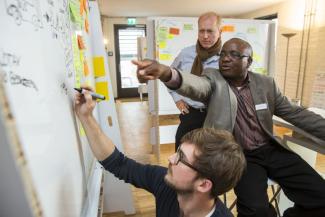Innovation
Mobilising and motivating investors

Zambia is struggeling to collect taxes. Only few citizens and companies pay regularly. The Zambia Revenue Authority would like to change matters. How to do so, was on the agenda of the first lab of tomorrow in Berlin in December. In cooperation with Zambian experts and leaders, including the commissioner general of the Revenue Authority and a former permanent secretary of the finance ministry, staff from large corporations such as SAP and Deloitte as well as small and mid-sized companies looked into the challenges for three days. The result was five promising ideas. One proposal was that entrepreneurs should have to register their tax numbers and indicate their incomes when signing up for a SIM card. This measure would provide the Revenue Authority with relevant data and enable it to identify tax evaders and keep in touch with tax payers.
The lab of tomorrow is run by GIZ on behalf of Germany’s Federal Ministry for Economic Cooperation and Development. One of the goals is to interest small and mid-sized German private-sector companies in investing in projects with social impacts in Africa, where many managers do not see any market potential. Obstacles also include risk aversion, lack of market information and access to networks. A good business idea might make the difference – and the workshops are geared to producing good ideas.
After the proposals on how to alleviate Zambia’s tax problems were spelled out, eight of the 11 participating companies agreed to carry on with the process. They are now preparing test runs in Zambia. Among other things, they want to get a grip on data security. Some of the companies have teamed up in consortiums.
Another proposal was to integrate several of the various IT systems Zambia’s government uses. It would make sense, for instance, to link the database of the office that runs the company register with the database of the Revenue Authority. That step would help to detect irregular behavior.
Yet another proposal considered the fact that many people do not pay taxes because they are not properly informed. Things might improve if corner shop owners and other owners of small businesses were trained and certified to give advice on tax accounting. Their services would be supported by a web app, so taxes could be declared via smartphone or tablet. Unlike desktop computers, these devices can be used even during the frequent power failures. The app must be operational offline too, so it would be useful in places with unreliable internet connectivity. As not everyone can afford such a device, the part-time accountants shall provide access to devices at their stores.
The workshop showed that German managers see business opportunities and are quite motivated to take part in the development process. The design-thinking method, which the GIZ uses, proved helpful. Google, IBM and other major corporations also use it to develop innovative products. The focus is always on the persons who will use a solution. During the first lab, the Zambian experts, who know their country’s ground reality, helped to ensure that focus. Early mistakes were made use of: ideas were tested, redefined and improved. Ultimately, the result was five good proposals.
The second lab took place in March; its topic was “Food not waste in Kenya”. In May, the topic will be smart logistics for improving access to pharmaceuticals in Kenya. At least four workshops will be held this year.
Simon Unterschütz is a project manager for the lab of tomorrow of GIZ.
simon.unterschuetz@giz.de
Link
Lab of tomorrow:
https://www.lab-of-tomorrow.com/












